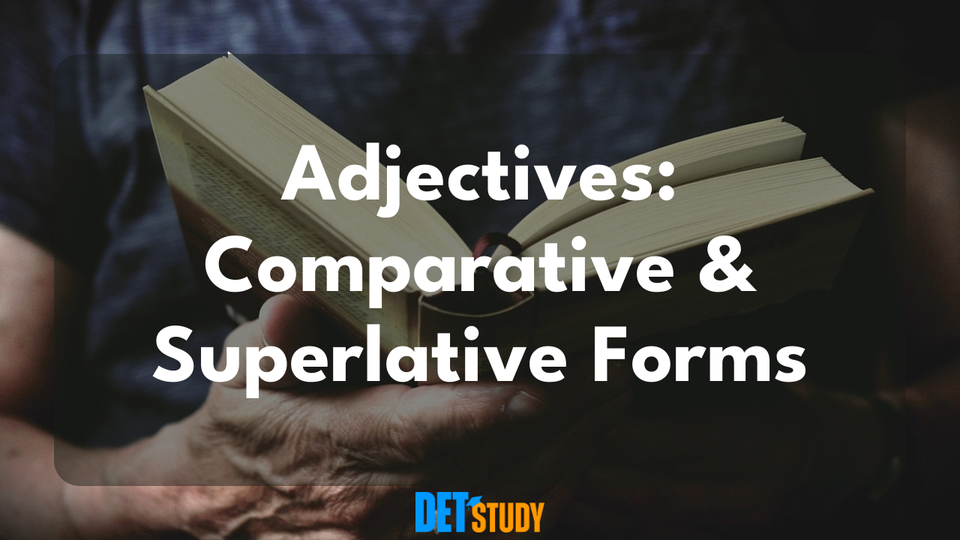玩转比较级与最高级形容词:轻松提升你的英语词汇量

形容词:掌握比较级和最高级
理解形容词:基础与重要性
形容词用于描述或修饰名词,增加细节,使语言更生动。🎨 掌握它们的使用,尤其是比较级和最高级形式,将大大提升您的英语沟通能力。
这些形式用于比较名词之间的性质:
Duolingo English Test 中“阅读然后口语”题的5个技巧比较级形式(比较两事物)
比较级通常以“-er”结尾,或者在形容词前使用“more”。例如:
- Tall: Taller(“Jenny is taller than Mark.”)
- Happy: Happier(“She is happier today.”)
- Beautiful: More beautiful(“The garden is more beautiful in spring.”)
对于两个或更多音节且不以“-y”结尾的形容词,使用“more”。
最高级形式(比较三件或更多事物)
最高级表示最高程度,通常以“-est”结尾,或者在形容词前使用“most”。例如:
- Fast: Fastest(“Usain Bolt is the fastest runner.”)
- Intelligent: Most intelligent(“She is the most intelligent student.”)
- Funny: Funniest(“He told the funniest joke.”)
对于两个或更多音节且不以“-y”结尾的形容词,使用“most”。
不规则形容词(必须记住)✨
有些形容词具有独特的比较级和最高级形式,不遵循标准规则。识别这些例外对于精确沟通至关重要:
- Good: Better, Best(“This is a better solution.” “This book is the best I've read.”)
- Bad: Worse, Worst(“His performance was worse.” “That was the worst experience.”)
- Far: Farther/Further, Farthest/Furthest(“She walked farther.” “This is the farthest city.” “We need further discussion.”)
- Little: Less, Least(“She has less money.” “This is the least expensive option.”)
- Much/Many: More, Most(“More people are here.” “That was the most interesting book.”)
- Old: Older/Elder, Oldest/Eldest(“My sister is older.” “He is the eldest member.” 注意:“Elder/eldest”通常指人,尤其是家庭成员。)
记住这些形式,因为它们对于细致入微的英语表达至关重要。语境会影响“farther”(指物理距离)与“further”(指抽象概念)的选择。
构成形容词比较级和最高级:规则
这些形容词的构成取决于它们的结构。以下是需要记住的关键规则:👇
1. 单音节形容词
比较级加-er,最高级加-est。
- Cold: Colder, Coldest(“Today is colder.” “January was the coldest month.”)
- Tall: Taller, Tallest(“She is taller.” “He is the tallest person.”)
如果单音节形容词以“单一辅音 + 单一元音 + 单一辅音”(CVC 模式)结尾,在添加-er或-est之前,需要双写最后一个辅音。
- Big: Bigger, Biggest(“This apple is bigger.” “That is the biggest tree.”)
- Hot: Hotter, Hottest(“The soup is hotter.” “July is the hottest month.”)
2. 以-y结尾的形容词
对于以-y结尾的双音节形容词,将-y改为-i,然后添加-er或-est。
- Happy: Happier, Happiest(“She felt happier.” “That was the happiest day.”)
- Easy: Easier, Easiest(“This test is easier.” “That was the easiest question.”)
3. 双音节及更长形容词(不以-y结尾)
比较级使用“more”,最高级使用“most”。
- Beautiful: More beautiful, Most beautiful(“This painting is more beautiful.” “That is the most beautiful flower.”)
- Difficult: More difficult, Most difficult(“This puzzle is more difficult.” “This was the most difficult decision.”)
有些双音节形容词,如“narrow”或“clever”,既可以使用-er/-est,也可以使用more/most。例如,Narrow: Narrower/More narrow, Narrowest/Most narrow。
如何在Duolingo English Test中识别真假词:成功秘诀4. 以-e结尾的形容词
比较级只需加-r,最高级加-st。
- Large: Larger, Largest(“Her house is larger.” “This is the largest cake.”)
- Simple: Simpler, Simplest(“Instructions need to be simpler.” “She provided the simplest explanation.”)

写作中形容词比较级和最高级的使用技巧✍️
遵循以下指导原则,实现清晰正确的写作:
-
理解基础知识: - 比较级用于比较两件事物:“Tom is taller than Jerry.” - 最高级用于比较三件或更多事物:“Alice is the tallest in the class.”
-
规则形式回顾: - 单音节形容词:加-er/-est(Tall: Taller, Tallest)。 - 以-y结尾的形容词:将y改为i,加-er/-est(Happy: Happier, Happiest)。
-
“More”和“Most”: - 对于大多数双音节或更长的形容词:使用“more”(比较级)和“most”(最高级)。(Beautiful: More beautiful, Most beautiful)。
-
避免冗余: - 切勿使用双重比较级或最高级(例如,“more taller”或“most tallest”)。它们是错误的。🚫
-
记住不规则形式: - 不规则形式(Good: Better, Best; Bad: Worse, Worst)必须记住。
-
语境与清晰度: - 确保被比较的主体清晰。根据事物的数量和句子的逻辑意义选择比较级或最高级。
-
正确的比较: - 比较两件事物时使用比较级,而不是最高级。说“Jan is taller than Chris”,而不是“Jan is the tallest of the two。”
运用这些技巧将改进您的写作,使比较更加精确和生动。✨
DET Study 提供超过15,000道练习题,以强化您的语法,尤其是在形容词和副词方面。自信而精准地准备Duolingo English Test,以达到您理想的成绩。🚀
🎯 需要更多练习?访问 DETStudy.com,获取专业资源、15,000多道练习题和AI驱动的反馈。

